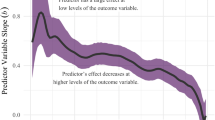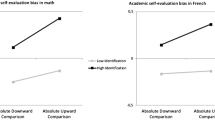Abstract
Eighty pupils of different academic levels (i.e. strong vs weak) were asked to make estimations about the different subjects taught at school. Gathered post-experimentally, the data allow specification of the relation to intelligence in which each school subject stands for the two different types of subjects. Evaluations of the significations accorded to performances in the different disciplines were also obtained. In accordance with expectations, analysis of these estimations reveals that pupils in a failure situation have an “original” conception of the field of academic comparison. However, the data obtained show that this originality (i.e. this social differentiation) stays within the dominant value system which sets the confines of the field of academic comparison. Taken in conjunction with more experimental results reported elsewhere, these estimations suggest that the cognitive attitude adopted by subjects towards an object of knowledge (here academic) can, in certain conditions, be formed independently of the social significations associated with this object but not independently of the nature of the social insertion which subjects undergo at the time of this interaction.
Similar content being viewed by others
References
Apple, M. W. (1976). Curriculum as ideological selection.Comparative Education Review, 20, 209–215.
Brodie, T. A. (1964). Attitude toward school and academic achievement.Personnel and Guidance Journal, 43, 375–78.
Chambon, M. (1990). La perception d’une discipline scolaire par les élèves. Représentation et effets identitaires.European Journal of Psychology of Education, 5, 337–54.
Darley, J. M., & Goethals, G. R. (1980). People’s analyses of the causes of ability-linked performances.Advances in experimental social psychology, 13, 1–37.
France-Kaatrude, A. C., & Smith, W. P. (1985).Children’s interest in social comparison information. Paper presented at the biennial meeting of the society for research in child development, Toronto, Ontario, Canada; April.
Frey, K. S., & Rubble, D. N. (1985). What children say when the teacher is not around: conflicting goals in social comparison and performance assessment in the classroom.Journal of Personality and Social Psychology, 48, 550–62.
Goethals, G. R., & Darley, J. M. (1987). Social comparison theory: self-evaluation and group life. In B. Mullen & G. R. Goethals (Eds.),Theories of group behavior, (pp. 21–47). New-York: Springer-Verlag.
Haladyna, T., & Thomas, G. (1979). The attitudes of elementary school children toward school and subject matters.Journal of Experimental Education, 48, 18–23.
Lemaine, G. (1966). Inégalité, comparaison et incomparabilité: esquisse d’une théorie de l’originalité sociale.Bulletin de Psychologie, 20, 24–32.
Lemaine, G. (1974). Social differentiation and social originality.European Journal of Social Psychology, 4, 17–52.
Levine, J. M. (1983). Social comparison and education. In J. M. Levine & M. C. Wang (Eds.),Teacher and student perception: implication for learning, (pp. 29–56). Hillsdale, NJ: Erlbaum.
Monteil, J. M. (1988). Comparaisons sociales, stratégies individuelles et médiations socio-cognitives. Un effet de différenciation comportementale dans le champ scolaire.European Journal of Psychology of Education, 3, 3–19.
Monteil, J. M. (1991a). Toward a social psychology of cognitive functioning: theoretical outline and empirical illustrations. In M. Von Granach, W. Doise & G. Mugny (Eds.),Social representations and the social bases of knowledge, (pp. 94–105). Berne: Hubert.
Monteil, J. M. (1991b). Social regulations and individual cognitive functioning: effects of individuation on cognitive performance.European Journal of Social Psychology, 21, 225–37.
Monteil, J. M., & Huguet, P. (1991). Insertion sociale, catégorisation sociale et activités cognitives.Psychologie Française, 36, 35–46.
Mosatche, H. S., & Bragonnier, P. (1981). An observational study of social comparison in preschoolers.Child Development, 52, 376–78.
Mugny, G., & Carugati, F. (1985).L’intelligence au pluriel, les représentations sociales de l’intelligence et de son développement. Fribourg: DelVal.
Mummendey, A., & Schreiber, H. J. (1983). Better or just different? Positive social identity by discrimination against, or by differentiation from outgroups.European Journal of Social Psychology, 13, 389–97.
Rijsman, J. (1983). The dynamics of social competition in personal and categorical comparison-situationsCurrent Issues in European Social Psychology, 1, 279–312.
Robinson, W. P., Tayler, C. A., & Piolat, M. (1990). School attainment, self-esteem, and identity: France and England.European Journal of Social Psychology, 20, 387–403.
Roshal, S. M., Frieze, I., & Wood, J. T. (1971). A multitrait-multimethod validation of measure of student attitudes toward school, toward learning, toward technology in sixth grade children.Educational psychological measurement, 31, 999–1006.
Rubble, D. N., Feldman, N. S., & Boggiano, A. K. (1976). Social comparison between young children in achievement situations.Developmental Psychology, 12, 192–97.
Tesser, A. (1988). Toward a self-evaluation maintenance model of social behavior.Advances in Experimental Social Psychology, 21, 181–227.
Van Knippenberg, A. (1978). Status differences, comparative relevance and intergroup differentiation. In H. Tajfel (Ed.),Differentiation between social groups (pp. 125–38). London: Academic press.
Author information
Authors and Affiliations
Rights and permissions
About this article
Cite this article
Huguet, P., Monteil, J.M. Social comparison and cognitive performance: A descriptive approach in an academic context. Eur J Psychol Educ 7, 131–150 (1992). https://doi.org/10.1007/BF03172890
Received:
Revised:
Issue Date:
DOI: https://doi.org/10.1007/BF03172890




